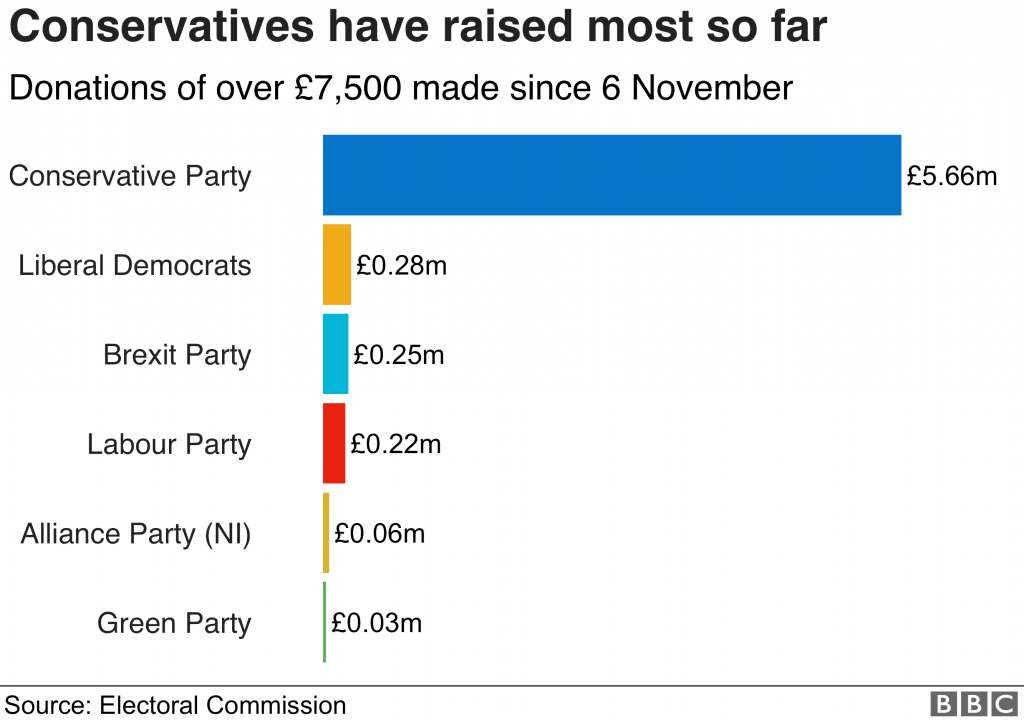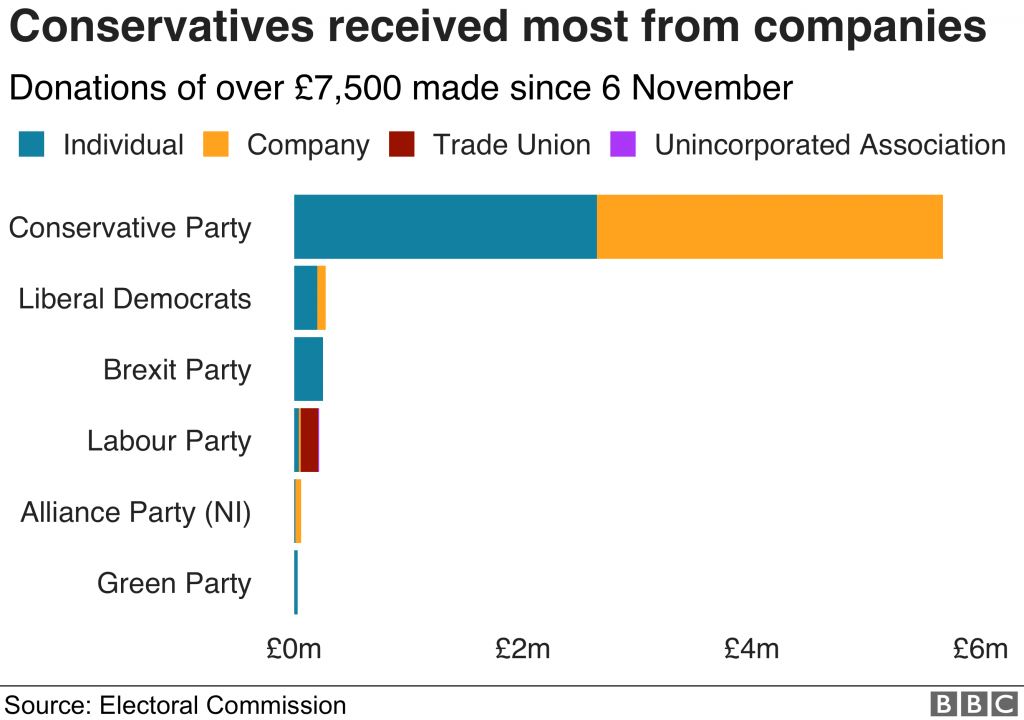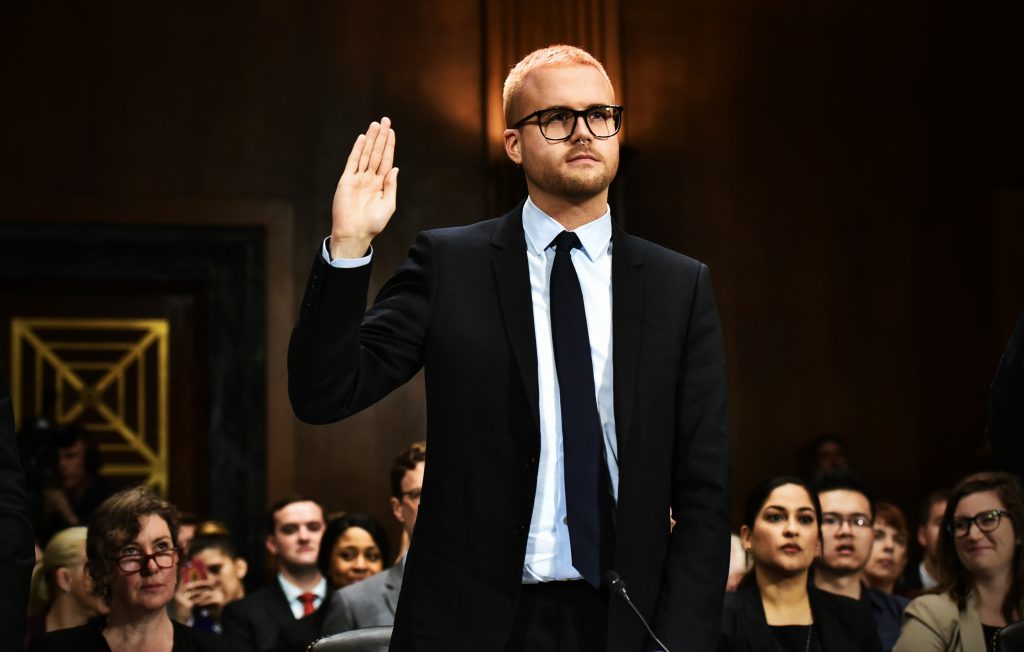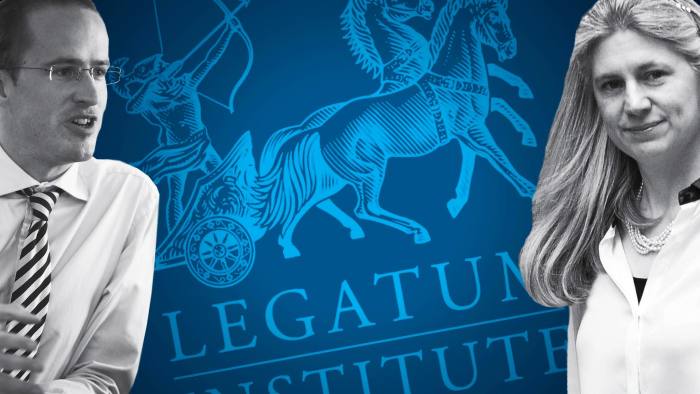As December 12th General Election draws near, attention is drawn to both the source and size of Boris Johnson’s campaign financing versus Jeremy Corbyn as leader of the opposition. As public trust in politics is continuously eroded, who is supporting our political parties is more important than ever.
Commentators are concerned by the motivations behind Conservative backers after they financed a disinformation campaign against Labour on social media, one prominent example being the fake “fact-checking” services to endorse Johnson during the televised election debate.
How Much Are We Talking?
The Electoral Commission stated the Conservatives raised £8.6 million compared with Labour’s £3.7 million in the first two weeks. Labour’s largest donation was Unite union with £3 million and the Communication Workers Union with £425,000. Conservative money came from 61 different donors, including hedge fund managers and steel magnate Lakshmi Mittal.
Labour and the Liberal Democrats are currently outspending the Conservatives on Facebook adverts ahead of the election. Pro-EU Lib Dems spent £212,302 this week, according to Facebook data, considerably more than the Conservatives £19,000.

Why Do We Care?
It’s perceived to be important that politicians reveal their funding sources, because there is the obvious potential for conflicts of interest to arise, motives to be distorted, and sub-optimal public outcomes to occur when politicians are able to accept conditional (implicit or otherwise) donations without scrutiny.
Many people don’t like the idea people can spend their money how they would like to. They fear some candidate will kiss up to the right groups and accumulate enough money, that even with terrible policies, they are able to win an election.
To prove their point, they point to the largest campaign donor lists being filled with unions that spend more than these billionaires people fear would wield undue influence because of their vast concentrations of wealth.

Contributions to a campaign don’t just come in the form of cash, so it is important to look beyond this. Media outlets and think tanks dedicate immense time to push candidates, in what is essentially free advertising.
Just because politicians are offered large cheques, it doesn’t mean they are going to accept them. There is a self-labelled civil rights organisation in America that tries to spend its money on politicians every year to get someone into office who looks favourably on them and their “rights”. Their money is always returned. They are called the North American Man-Boy Love Association, or NAMBLA for short, and are in favour of exactly what it sounds like. Just because a politician has money thrown at them, doesn’t mean they are going to be slaves to the source, or even take the money.
We have witnessed considerable frustration and outpourings from those not willing to accept their ideas are not good enough to be voted on. In looking for something else to blame, they often point fingers at the other side having more money, despite a lack of solid evidence to support that idea. So, they keep coming up with ideas about how to limit money in politics. Maybe this misses the wood for the trees…
Where We Should Really Turn Our Attentions
What matters more is the manipulation that Big Data can generate. Whipping up public outrage into a furore with fake news, like the Cambridge Analytica scandal over voter influencing, has far greater impact today than ever before. The company touted its expertise in ”psychological warfare” and “influence operations.” It’s long claimed that its sophisticated understanding of human psychology helps it target and persuade people of its clients’ preferred message.

Much of Brussels EU and British politics is dominated by public relations “spin-doctors”. Political postulating to restore faith and trust in politicians marred by waltzing from one scandal into the next, has become worth its weight in gold. Take Boris’ many hiccups and yet he has been voted into the highest office in the UK, it would surely beggar belief if anyone suggested this a few years or even months ago. Despite the recent publicity of utilising all our vast, collective reserves of online data profiles, we are largely oblivious to the immense psychological manipulation at work behind the scenes, much of which is the work of PR doctors and young analysts in an ever-expanding political class.
The political class has expanded with new career paths opening. Young people interested in politics can now go straight from university into jobs situated on the fringes of Parliament – political advisers, research assistants to MPs, analysts in policy research bodies and lobbyists for organisation representing special interests. This meant that the Conservative Party could better compete with the Labour Party, which had long relied on trade unions as incubators of political talent. At the same time, political reporting and analytical “expert takes” in the media have become more prevalent and ever younger.
Alternative Viewpoint
It sits uneasy with voters in a one person, one vote system that an individual possessing immense wealth and resources at their disposal can have an outsized influence on public policy.
These individuals can afford to donate to candidates they favour and keep track of how those who accept their donations vote on the issues that matter to them. Lower taxes is often one such example of what is pushed for by the wealthy donors, whether for their companies or personally. It will likely benefit them, but not the nation. No one on either side of the political spectrum should wield that kind of influence.
Think tanks have substantial scope to influence journalists, policymakers, and the public. While their transparent declaration of these interests is a good thing for democracy, relying in large part on this clarity, the notion they shouldn’t have this obligation because they are a private body is perplexing. After all, private organisations are bound by conditions to operate in our country: taxation and regulation being just two; what makes this different? And why should the right of corporations to operate without scrutiny be prioritised over the right of the public to scrutinise them?
Donations are not exclusively to the political parties themselves. Eleven wealthy American donors gave £2.86 million to right-leaning UK groups over 5 years. This brings into question the influence of foreign funding on British politics, for example the delicate reframing of selling off the NHS to foreign interests to present it in an acceptable way to the sensibilities of the British public.
The Legatum Institute, a British think tank, was afforded $1.5 million from the Templeton Foundation to ‘support its research on the impact of economic openness and low-regulation on global growth and prosperity.’ The Charity Commission forced Legatum to remove a report advocating a hard Brexit from its foundation’s website on account of it being too partisan. Charities are required by law to be politically neutral. It stopped its work on Brexit last year both as a result and to avoid drawing unwanted attention.

Ultimately, donors want a return on that money. It isn’t a gift, it is an investment of sorts – whether to garner interest, favourability, the bored musings of power or a tangible financial return at some future time.
If only the richest candidates are heard based on their publicity spending and promotion or sympathetic airtime by lobbyists and think tanks, it produces an unbalanced climate (bordering on bribery) rather than based on nobler political aims to improve conditions of all voters, not just the richest party’s supporters. Donated money and influence buys access to power. After all, you won’t catch Boris having lunch with poor people from broken northern mining communities. They save that privileged ear, not unsurprisingly, from those who donate heavily to their campaigns. To heal corrosion of trust, reform should be considered to ensure a larger proportion of funding comes from the public. Next time this comes to the forefront of the agenda, we should continue to scrutinise underlying motivations: why do the donors donate? Because it is unlikely nothing is desired in return.


